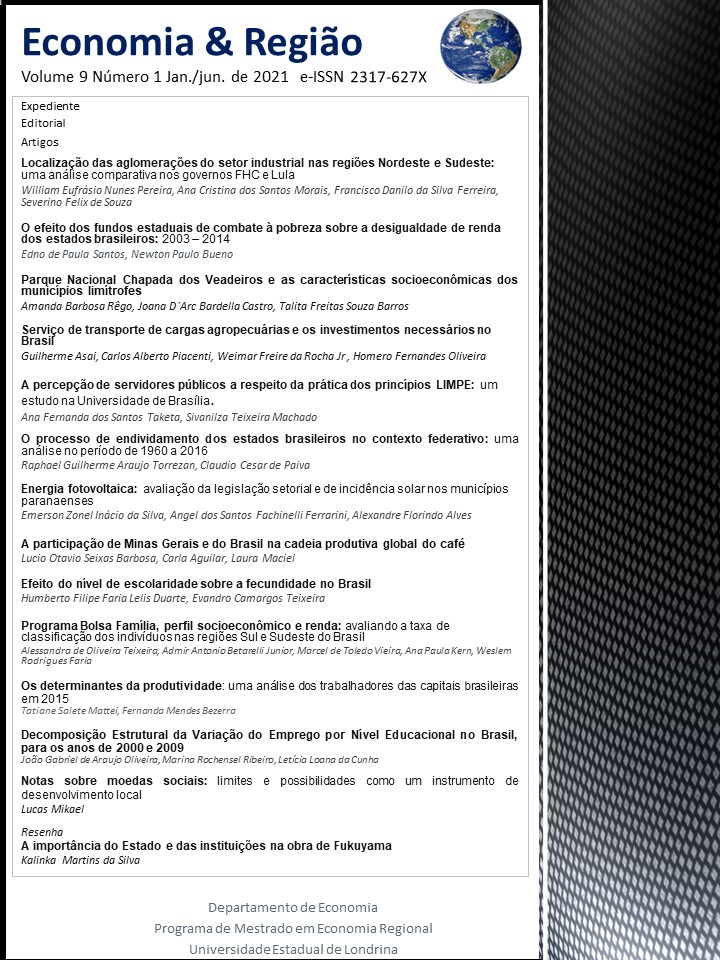Effect of education level on fertility in Brazil
DOI:
https://doi.org/10.5433/2317-627X.2021v9n1p167Keywords:
Fertility, Education level, Ordered ProbitAbstract
The main objective of this study is to analyze the effect of the level of education on the fertility of Brazilian women. For this, an Ordered Probit model is used with data from the National Household Sample Survey (PNAD), promoted by the Brazilian Institute of Geography and Statistics (IBGE), in 2015. Specifically, women in the sample are taken into account. aged between 15 and 49 years, as this age group officially corresponds to the woman's fertile period, as used to calculate the total fertility rate. In the results, it was found that the higher level of education decreases the fertility of Brazilian women and, thus, the total fertility rate in the country. Regarding the completion of school cycles, it is possible to conclude that the completion of high school is the one that most contributes to the reduction of the number of children, followed by the completion of higher education and elementary education. Thus, it is concluded that the promotion of educational public policies can contribute to greater female empowerment with consequent effect regarding the decision of having or not children.Downloads
References
ALVES, José Eustáquio Diniz; CAVENAGHI, Suzana. Transições urbanas e da fecundidade e mudanças dos arranjos familiares no Brasil. Cadernos de Estudos Sociais, v. 27, n. 2, 2012.
BALBINOTTO NETO, Giacomo. Gary Becker: prêmio nobel de economia de 1992. Análise econômica. Porto Alegre. v. 11, n. 19, p. 188-191, 1993.
BARROS, Ricardo Paes de; MENDONÇA, Rosane. Investimentos em educação e desenvolvimento econômico. Texto para discussão TD IPEA 525, 1997
BARROSO, Carmem. Metas de desenvolvimento do milênio, educação e igualdade de gênero. Cadernos de Pesquisa, v. 34, n. 123, p. 573-582, 2004.
BILLARI, Francesco C.; FILIPOV, Dimitur. Education and the transition to motherhood: a comparative analysis of Western Europe. Vienna Institute of Demography, Austrian Academy of Sciences, 2004.
BECKER, Gary S. An economic analysis of fertility. In: Demographic and economic change in developed countries. Columbia University Press, 1960. p. 209-240.
BERQUÓ, Elza; CAVENAGHI, Suzana. Fecundidade em declínio: breve nota sobre a redução no número médio de filhos por mulher no Brasil. Novos Estudos-CEBRAP, n. 74, p. 11-15, 2006.
BERQUÓ, Elza; CAVENAGHI, Suzana. Brazilian fertility regimes: profiles of women below and above replacement levels. In: INTERNATIONAL CONFERENCE IUSSP, 25., 2005, França. Anais... Tours, França: IUSSP. 2005.
BERQUÓ, Elza S.; CAVENAGHI, Suzana M. Notas sobre os diferenciais educacionais e econômicos da fecundidade no Brasil. Revista Brasileira de Estudos de População, v. 31, n. 2, p. 471-482, 2014.
CACCIAMALI, Maria Cristina; HIRATA, Guilherme Issamu. A influência da raça e do gênero nas oportunidades de obtenção de renda-uma análise da discriminação em mercados de trabalho distintos: Bahia e São Paulo. Estudos Econômicos, São Paulo, v. 35, n. 4, p. 767-795, 2005.
DRÈZE, Jean; MURTHI, Mamta. Fertility, education, and development: evidence from India. Population and development Review, v. 27, n. 1, p. 33-63, 2001.
FAGUNDES, T. C. P. C. Empoderamento feminine: uma abordagem educativa. Revista Brasileira de Sexualidade Humana, v. 28, n. 2, p. 87-94, 2017.
FÁVERO, Luiz Paulo; FÁVERO, Patricia. Análise de dados: modelos de regressão com Excel®, Stata® e SPSS®. Elsevier Brasil, 2016.
GUPTA, Neeru; LEITE, I. da C. Tendências e determinantes da fecundidade entre adolescentes no Nordeste do Brasil. Perspectivas Internacionais de Planejamento Familiar, v. 2, n. Esp, p.24-30, 2001.
INSTITUTO BRASILEIRO DE GEOGRAFIA E ESTATÍSTICA. COORDENAÇÃO DE POPULAÇÃO E INDICADORES SOCIAIS. Tendências demográficas: uma análise dos resultados da amostra do censo demográfico 2000. Rio de Janeiro: IBGE, 2004.
INSTITUTO BRASILEIRO DE GEOGRAFIA E ESTATÍSTICA. BRASIL EM SÍNTESE. Disponível em https://brasilemsintese.ibge.gov.br/populacao/taxas-de-fecundidade-total.html. Acesso em: 29 dez. 2018.
LOPES, Janete Leige; PONTILI, Rosangela Maria. Renda familiar e educação como fatores condicionantes do aumento da taxa de fertilidade: uma análise para a Região Sul do Brasil. Revista Cadernos de Economia, v. 14, n. 27, p. 25-35, 2010.
MCKELVEY, Richard D.; ZAVOINA, William. A statistical model for the analysis of ordinal level dependent variables. Journal of mathematical sociology, v. 4, n. 1, p. 103-120, 1975.
MARION FILHO, Pascoal José; REICHERT, Henrique. Condicionantes econômicos e sociais da fecundidade no brasil. Revista Ciências Sociais em Perspectiva, v. 16, n. 30, p. 39-57. 2017.
MARTIN, Teresa Castro. Women's education and fertility: results from 26 Demographic and Health Surveys. Studies in family planning, v.26, n.4, p. 187-202, 1995.
MENDES, Maria Filomena; REGO, Conceição; CALEIRO, António. Educação e Fecundidade em Portugal: As diferenças nos níveis de educação influenciam as taxas de fecundidade? Economics Working Papers 10_2006, University of Évora, Department of Economics (Portugal), 2006.
MINISTÉRIO DA SAÚDE. DATASUS. Indicadores demográficos. IDB Brasil 2000. Disponível em: http://tabnet.datasus.gov.br/cgi/idb2000/fqa05.htm. Acesso em 03 jan. 2019.
MUSICK, Kelly et al. Education differences in intended and unintended fertility. Social Forces, v. 88, n. 2, p. 543-572, 2009.
NASCIMENTO, Danielle. Teoria Microeconômica de Becker e Fecundidade no Brasil. Geografares, n. 13, p. 224-254, 2012.
OLIVEIRA, Isabel Tiago de. Fecundidade e educação. Revista de Estudos Demográficos, n. 40, p. 5-19, 2007.
VIERA, Seperak; ANGÉLICA, Rosa; RIVERA CALCINA, Renzo. Determinantes sociodemográficos de la alta fecundidad en mujeres peruanas. Revista chilena de obstetricia y ginecología, v. 83, n. 5, p. 452-463, 2018.
Downloads
Published
How to Cite
Issue
Section
License
Economia & Região adota a Licença Creative Commons Attribution CC-BY 4.0 International, portanto, os direitos autorais relativos aos artigos publicados são do(s) autor(es), que cedem à Revista Economia & Região o direito de exclusividade de primeira publicação.
Sob essa licença é possível: Compartilhar - copiar e redistribuir o material em qualquer suporte ou formato. Adaptar - remixar, transformar, e criar a partir do material, atribuindo o devido crédito e prover um link para a licença e indicar se mudanças foram feitas.














